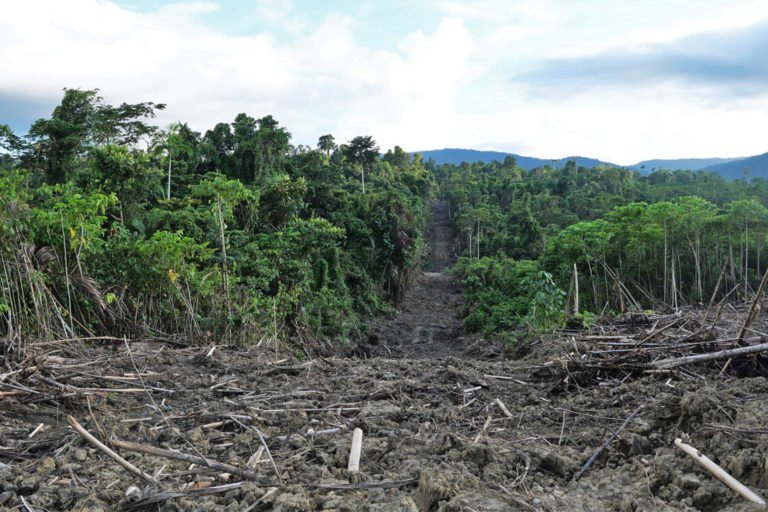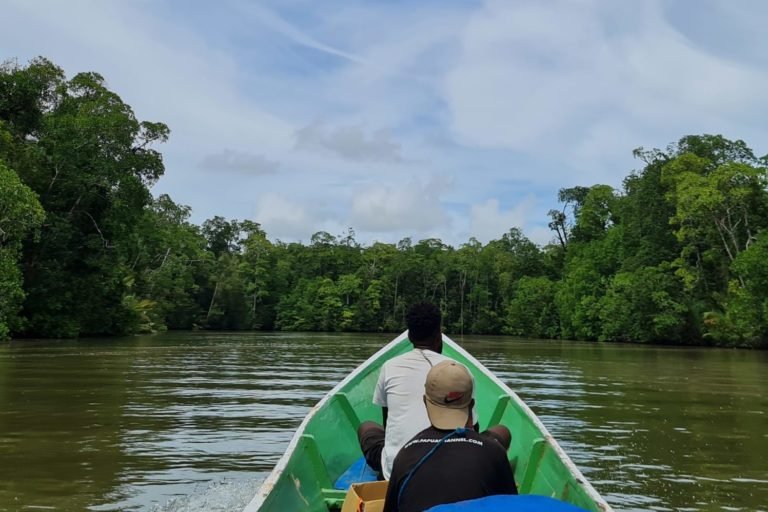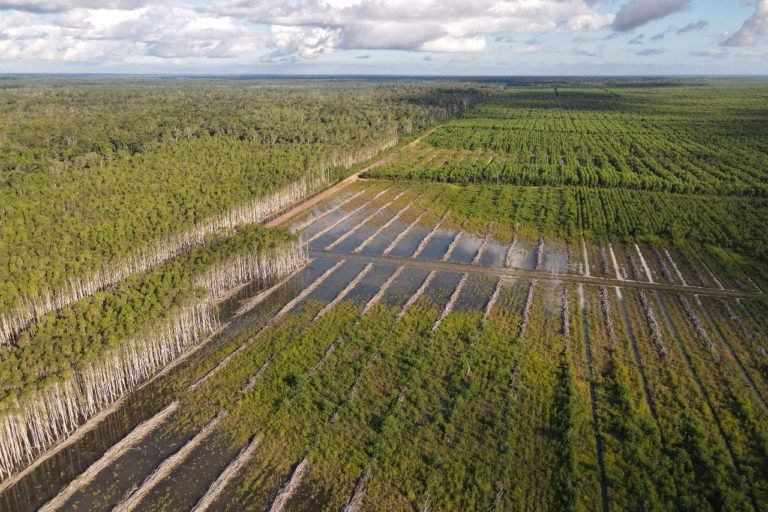- The Indonesian government has for the first time relinquished state forest into the custody of Indigenous communities in the eastern region of Papua, covering a combined area the size of New York City.
- Experts say this recognition of customary forests in Papua is significant as the region is threatened by increasing expansion of plantations, logging and mining operations, with Indigenous groups there having little to no legal protection against companies that covet their forests.
- With this official recognition, the government has essentially handed over its control over these forests to the Indigenous communities, and therefore no licenses for any kind of commercial activity can be issued for those areas.
- Activists have welcomed the move, but say it represents just a sliver of the millions of hectares of ancestral forest that are still waiting to be officially acknowledged in the Papua region.
JAKARTA — The Indonesian government has recognized community claims to ancestral forests in the country’s eastern Papua region for the first time in history, a move that environmentalists say could help preserving one of most biodiverse regions on the planet.
The Ministry of Environment and Forestry on Oct. 24 handed over decrees that recognized customary forests for seven Papuan Indigenous groups. The groups are the Syuglue Woi Yansu (who received title to 16,493 hectares, or 40,755 acres), Yano Akrua (2,226 hectares, or 5,500 acres), Yano Meyu (501 hectares, or 1,238 acres), Yosu Desoyo (3,394 hectares, or 8,387 acres), Yano Wai (594 hectares, or 1,468 acres), Yano Takwobleng (405 hectares, or 1,468 acres), and Ogoney (16,299 hectares, or 40,276 acres).
The Ogoney forests are in West Papua province, while the rest are in Papua province’s Jayapura district. Together, they span 39,911 hectares (98,622 acres), an area half the size of New York City.
Indigenous rights activists and agrarian experts say official acknowledgment of their customary forest rights has been a long time coming for communities in Papua.
“It’s about time Papuans get recognition,” Rina Mardiana, head of the agrarian studies program at the Bogor Institute of Agriculture (IPB), told Mongabay. “Since colonial times, Indigenous peoples have been sidelined, and it has only gotten worse after Indonesia gained independence. Their identities are decaying and their lands are turned into objects for [economic] development.”
The recognition came nearly a decade after the nation’s highest court ruled in 2013 that customary forests should not be classified as state forests. Prior to that landmark ruling, all 120 million hectares (297 million acres) of land in Indonesian designated as forest areas fell under the control of the state.
Indigenous peoples have lived in these areas since before Indonesia as a country existed, but their rights to their forests were never officially acknowledged until the 2013 ruling. Through the ruling, the Constitutional Court essentially ordered the government to relinquish its control over customary forests that overlap with state forests to Indigenous communities.
Since then, however, the government has relinquished only 108,577 hectares (268,300 acres) of state forests to Indigenous communities as of October 2022. Until the recent handover, none of this land was in the Papua region, which comprises the western half of the island of New Guinea.
Best custodians of the forest
The decision comes as the Papua region experiences increasing rates of deforestation, due largely to a renewed government focus on boosting development there. In recent years, palm oil companies have begun moving in, quickly mowing down vast swaths of some of Indonesia’s last pristine forests.
In response, Indigenous activists and environmentalists have been pushing the government — in this case the Ministry of Environment and Forestry which has the authority to return custody of state forests to Indigenous groups — to recognize Indigenous peoples’ rights to their forests.
Studies have shown that Indigenous peoples are the best custodian of forests. A six-nation study for the World Bank’s Program on Forests found deforestation rates are significantly lower where communities have legal rights to the forests and government support for management and enforcement, compared with areas elsewhere.
Indigenous rights activists in Papua say this makes the case for recognizing customary forests to protect them from the expansion of exploitive industries like palm oil, logging and mining.
Once a forest has been declared customary land, the government can no longer award permits for its commercial exploitation, said Zoel Hisbullah from the Ancestral Domain Registration Agency (BRWA), a civil society initiative working to map Indigenous lands all over Indonesia. But as long as they remain state forests, “then government permits can still be easily issue” permits for businesses to exploit them, he said.
Yustina Ogoney, a member of the Ogoney clan, one of the seven whose ancestral forest rights were recently recognized, said it was important to push back against the spread of deforestation in the region.
“Through our customary forests, we Indigenous peoples in Papua, especially the Ogoney clan, are fighting against the timber concessions that bulldoze our forests,” she said.

Entrusted to protect the land
The Ogoney application was verified by a team led by Rina, the IPB agrarian researcher. Rina said the recognition should allow the clan to manage their forests and protect them from degradation.
“They’re no longer threatened by parties that might evict them from their own lands in the name of development,” she said.
She added the recognition is also significant because forests aren’t just important to Indigenous Papuans from a livelihood aspect, but also from a cultural one.
“Indigenous peoples in Papua have a connection to their lands and forests that is very strong, even eternal,” Rina said. “They can’t afford to have their forests damaged, because there are sacred graveyards, sago hamlets and other culturally significant places in these forests. Their identities are tied [to their forests]. So what will happen when these concessions cut down their forests?”
The six other Papuan clans’ customary forest applications were facilitated by the BRWA, whose head, Kasmita Widodo, welcomed the government’s move to recognize them as important to preserving forest areas that are still largely untouched and home to endemic species like birds-of-paradise.
The island of New Guinea, which Indonesia shares with the country of Papua New Guinea, is home to 44 species of unique birds-of-paradise that are found nowhere else on Earth. Some of the recently recognized customary forests also overlap with the Cyclops Mountains, a coastal range designated as a nature reserve, Kasmita said.
This means the government is entrusted Indigenous Papuans to preserve their forests within the nature reserve, he said. This is atypical, he added, given that the government is usually reluctant to recognize customary forests inside protected areas like nature reserves and national parks.
He also highlighted the size of customary forests recognized in Papua, with the Ogoney one, at 16,299 hectares, the largest of its kind recognized to date by the government anywhere in Indonesia. Most of the customary forests in other regions range in size from hundreds to thousands of hectares.

Much more forest to recognize
Franky Samperante, director of Yayasan Pusaka, an NGO that works with Indigenous peoples in Papua, said the number of officially recognized customary forests in the region is still too little.
“Why there are only seven customary forests recognized?” he said.
There are 38.15 million hectares (94.27 million acres) of state forest in the Papua region, and according to BRWA, there are at least 8.13 million hectares (20.09 million acres) of customary forests in Papua and the neighboring region of Maluku. The vast majority of these have still not been recognized, Franky said.
Kasmita said this first batch of recognized customary forests could precipitate more communities getting their land rights acknowledged.
“This is an important milestone because it’s the first in Papua and we hope the next [set of customary forests] will be easier,” he said, adding that more could be forthcoming in the next few months.
Muhammad Said, the director for customary forests at the Ministry of Environment and Forestry, said this initial round of recognition could serve as the template for future acknowledgment of ancestral lands in Papua. He said the verification and identification process involved many stakeholders, including civil society, local government and the environment ministry, and took less than three months to process.
“If you want to learn how to get customary forest recognition fast, learn from [Papua]. The process is very fast [there],” Said told Mongabay in Jakarta.
The process was helped by the local government in Papua’s Jayapura district issuing a regulation on the recognition of the Indigenous peoples there in 2021. Such a bylaw is one of the requirements for the environment ministry to recognize customary forests. With it in place, other Indigenous groups in Jayapura should have an easier time gaining recognition of their customary forest rights, Said added.

Existing concessions still stand
Franky from Pusaka noted that some of the newly recognized customary forests have pre-existing logging concessions, and the ministry’s decree doesn’t void those concessions.
“[The government] should have ensured that these areas are clear of [commercial] permits [so that] the customary areas can be completely managed by the Indigenous people,” he said.
Rina of IPB confirmed that the Ogoney land included three logging concessions, but said that while they haven’t been revoked, there’s little likelihood of land disputes now that the community has its customary forest title.
The title effectively ensures that the concession holders must respect the Indigenous peoples’ rights in the area, Rina said.
“The logging companies can’t cut down trees in areas that are zoned for protection,” she said. “But they can negotiate and compromise [by logging] in areas zoned for production. This is because for Papuans, lands are forever tied to them, but anyone may use [their forests] as long as they ask for permission and there are agreements for sharing the benefits.”
Banner image: Indigenous peoples from various regions in Indonesia, including Papua, pose together during the 2022 congress of Indonesia’s main Indigenous alliance, AMAN, in Jayapura, Papua. Image by Asrida Elisabeth/Mongabay.
FEEDBACK: Use this form to send a message to the author of this post. If you want to post a public comment, you can do that at the bottom of the page.












